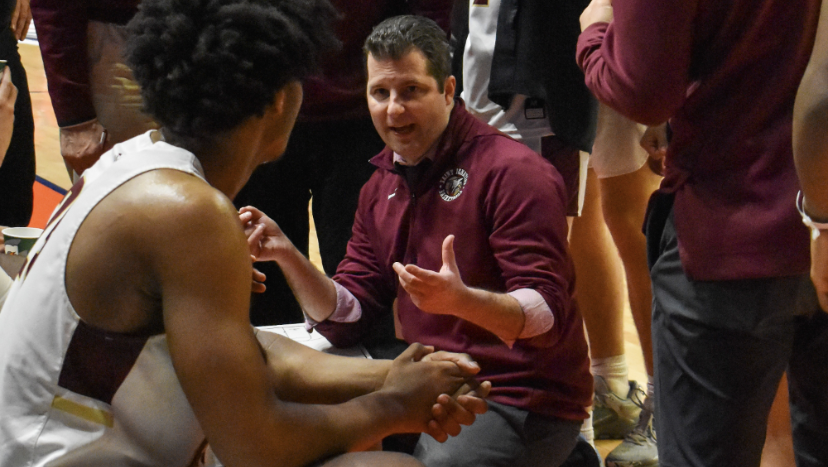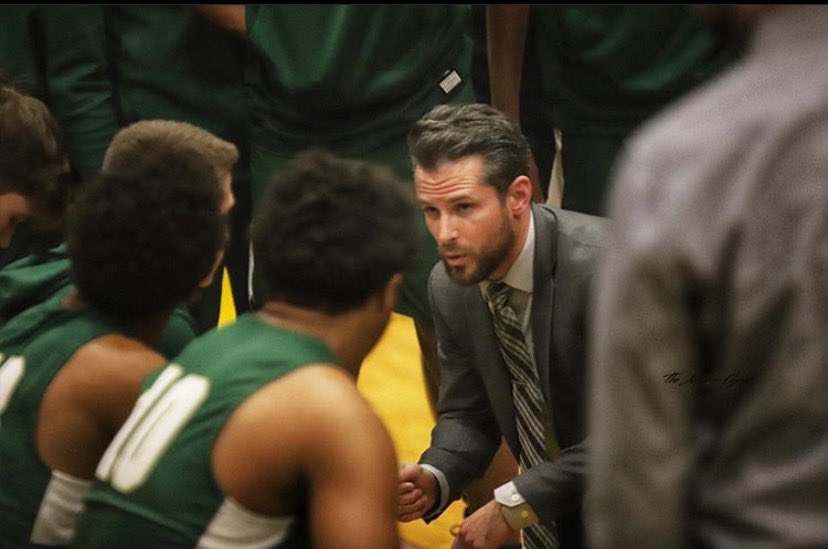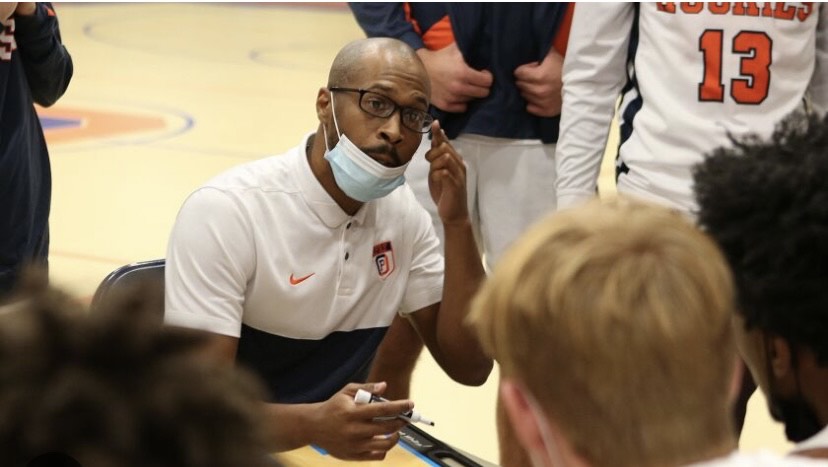9 min read
Putting Positive Coaching Into Practice
By IBCA - Illinois Basketball Coaches Association on May 22, 2023 12:00:00 AM
Topics: IBCA, #lessons, Basketball

The following is from Matt Monroe, Head Boys Basketball Coach at Saint Ignatius College Prep:
I’ve wanted to be a basketball coach since I was eight years old. While my peers were dreaming of playing in the NBA, I had my sights set on being the guy in a suit pacing up and down the sidelines. I traded in my playing shoes for a whistle and a clipboard early on when I began coaching at the age of eighteen. Throughout my twenty-two years of coaching, my philosophy regarding this profession has evolved greatly. The area in which my thoughts and actions have evolved the most have to do with leadership styles.
When I was growing up, the general construct of what most people considered a skilled and successful coach could be summed up by the following words: tough, passionate, competitive, hard-nosed, boisterous, intense. Coaches that live that construct often use fear, threats, and intimidation to “motivate” their players to achieve success. There have been plenty of coaches that have used these manipulations to achieve success and win championships. However, these tactics are just that, manipulations. Being what many label as a “coercive coach” can help you reach short-term goals, but ultimately will leave you falling short of any impactful long-term success.
After many years of coaching (with several more decades to go!), my definition of what makes a quality coach has changed. It’s not about wins and losses or fulfilling any type of coaching persona construct. What makes a coach successful is serving others and making a positive impact on those you serve. To me, a skilled and successful coach could be summed up by these words: loving, caring, relationship builder, inspiring, servant, teacher, motivator. As each year passes, these qualities become more solidified to me as what makes a coach highly skilled and successful.
The following are some best practices when it comes to coaching your players in a positive and productive way:
1. Start with Why
Author Simon Sinek’s book Start with Why is a great read for leaders in any type of organization. In it, he explains that any successful leader or organization has a much bigger purpose than what they do or what they produce. These leaders and organizations have a clear “why” in place, a vision and mission that drives what they do and inspires people to join in their cause. This couldn’t be any more applicable to coaching and building a program. Why are you a coach? If your why is about winning championships, gaining notoriety, making money, or anything else along those lines then you are in it for all of the wrong reasons. Not only that, but you will also struggle to achieve any long-term success or leave a lasting positive impact. Your why has to be much bigger than basketball. As a coach, we could win twenty-plus games every year and dozens of championships, but if I don’t have a positive impact on the lives of the players I coach then I am not a success.
2. Be a Relationship Builder
As a leader in any organization, your primary responsibility before you achieve any semblance of success is to build relationships with the people you serve. As a coach, this is paramount. Building relationships takes a lot of time and effort, but it is absolutely essential. How do you build effective relationships? There are many different ways. Start with showing your players that you care, that they are more to you than just a uniform with a number on it. It’s easy to be invested in their success on the court, but it has to about much more than that. You have to demonstrate that you are invested in their overall development as a person on and off the court.
3. Do as I Say, Not as I Do?
The game is still close, but it’s on the verge of breaking wide open. The coach calls a timeout after his team’s opponents go on a six point run. As his team huddles together on the bench, the coach throws his clipboard to the ground. Bursting with intensity, his eyes bulging out, he yells at his players, “Calm down! Everyone relax!” Chances are that you have seen this scene play out over and over again. Chances are also that the team with the coach throwing his clipboard and screaming to his players to calm down when he is not calm himself probably wasn’t able to stop the run and get the game under control. Too many times I’ve seen coaches expect their players to do what they say, but not what they do. I’ve fallen into this trap myself. Actions speak louder than words. The best coaches model the actions and behaviors they expect from their team. If you want your team to be calm during crunch time, then your message should be delivered in that very same way. Another example of consolidating what you say and what you do is body language. Body language is something almost all coaches harp on when it comes to their players. One thing I have tried to do the last several years is reflect on my own body language while I am coaching. What do I look like when a player makes a mistake on the floor? Do I roll my eyes or throw my hands up in the air? If I display that type of negative body language with my players, how can I expect them to not do the same?
4. Value People Over Outcomes
At the end of the day, coaches work in a profession centered on people. In today’s “what have you done for me lately” society, it’s easy to fall into the trap of defining someone’s worth based on their contributions to your organization. The players on your team are people first. Regardless of their role on the team or how much they produce on the court, you have to make everyone on your team (and everyone else in your organization) feel that you value them. From the star player to the player that struggles for playing time, everyone on your team needs to feel that they are important to you and the rest of the program. There’s a famous quote that people often use that says, “you’re only as strong as your weakest link.” I challenge this notion. If you’re a positive leader who runs a successful organization, there is no weakest link. Everyone is an important piece of the puzzle in determining your success, whether it’s the player that averages the most points, the manager on the team, or the person that keeps the gym floor clean. As a leader, you have to make it a priority to ensure that everyone in your program feels valued regardless of their role or what they produce.
5. Build Them Up
Positive coaches build players up, not break them down. Great leaders inspire the people they serve to be more. When a player makes a mistake or is struggling on the floor, chances are they don’t feel good about it. For example, when a player turns the ball over in a game he already feels bad that he made the mistake, hurt the team, and did so in front of a crowd. What do you accomplish by being negative with that player? What benefits are there for making him or her feel worse? The best coaches are teachers of the game. If this is the case, then every mistake is a teachable moment. Identify the problem, show the player how to correct it, and instill confidence in them that you believe they will get it right the next time they have the opportunity.
6. Don’t be a Front-Runner or a Fair-Weather Coach
When things are going well for your team, it’s easy to be a positive leader. Who wouldn’t be positive when their team is on a multi-game winning streak or when everything is clicking on all cylinders? It’s how you lead during times of adversity that matters the most. In the book You Win in the Locker Room First by Jon Gordon and Mike Smith, the authors talk about seven “C’s” to building a strong organization. One of the “C’s” that they highlight is the word consistency. As a coach, you should never waver from your guiding principles; they should be the same in victory and defeat. Don’t be a positive coach in times of success and a coercive coach in times of adversity.
7. Be True to Yourself
How many coaches can reflect on their practice and see that they are living a double life? What I mean is that they have two personas – a coaching persona and who they are in everything else they do. When your demeanor as a coach doesn’t match up with who you are as a person, you are not being true to yourself. That doesn’t mean that how you react to eating a good meal should be exactly the same as you would react to one of your players hitting a game winning shot. When you are on the floor your competitive spirit will and should come out. You will get louder, be more locked in, and get more intense. That is only natural as a coach’s personality definitely gets amplified on the practice floor or during games – and it’s a good thing. Coaches who are true to themselves never change their values, morals, or principles. They don’t become someone they are not just to have a little more success on the court. When you stay true to yourself as a coach you will not only be more comfortable with what your’e doing, you will find more fulfillment.
8. There is a Place for Tough Love
Being a positive coach doesn’t mean you can’t teach your players using tough love when the situation calls for it. As a coach, you have many tools in your toolbox to use depending on the needs of your players and your team at any given moment. Tough love is one of many tools you have at your disposal to teach your players and to help inspire them to be more. Tough love has to be just that – love. Using tough love doesn’t mean using fear, intimidation, or threats. Tough love is speaking the truth, being honest with your players about what they need to improve on to be more successful, and holding them accountable to living the standards that you have instilled into your program. Sometimes, when you speak the truth to your players about where they are at it can be uncomfortable for them. That’s perfectly normal and part of the process of getting better. When you give your players tough love, show them how they can be more and don’t just leave them with the things they are deficient at. Most importantly, however, is that when you give your players tough love make sure to show them that the reason you are is because you care about them.
9. Invest in Your Culture
The most successful basketball programs are not there by accident. Everyone within the program has a shared vision, a common set of values, and inspiration to work together to achieve their collective goals. Yes, you have to have talent and skill to win, but you can’t have sustainable success without a winning culture. The best teams have built a positive and productive culture that drives everything they do. There is no single way to build a winning culture, but many ways. What works well for some programs might not fit others. In my experience, most winning cultures are built on these pillars: positivity, teamwork, sacrifice, shared vision, caring, competitive nature, dedication, hard work, and love. To build a great culture, you must invest in it every day. It’s one thing to just put your vision and mission down on paper or hang a catchy slogan on a wall in your locker room. It’s another to live it and implement it in everything you do.
Being a positive coach will not guarantee you winning more games or getting that elusive championship. However, it will ensure that you will be a more successful coach and it will allow you to build a program based on a genuine care for those you are serving and will give you the greatest opportunity to make a lasting positive impact on everyone you encounter.
Coach Spotlight
 |
Matt Monroe has been the Head Boys Basketball Coach at Saint Ignatius College Prep in Chicago, IL since 2016. Prior to arriving at Saint Ignatius, he as an assistant coach at Saint Patrick High School, Vernon Hills High School, Niles West High School, and Deerfield High School over period of 15 years. In addition to coaching at Saint Ignatius, he is also an IBCA Executive Board member. Twitter: @CoachMMonroe |
If you're interested in contributing to the IBCA Coaching Resources page, please CLICK HERE to fill out our interest form.




